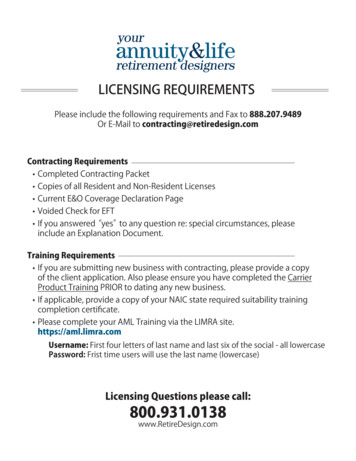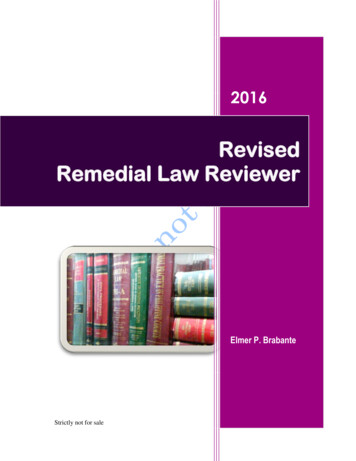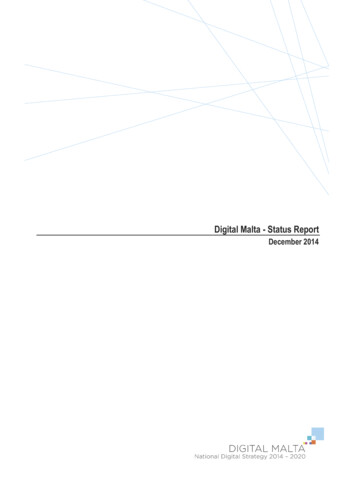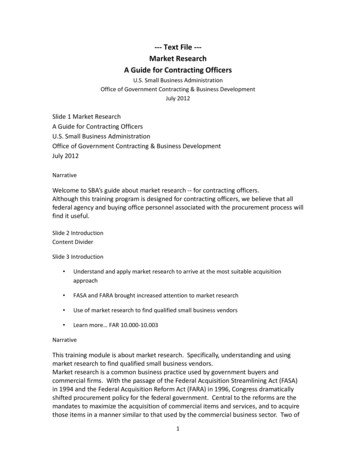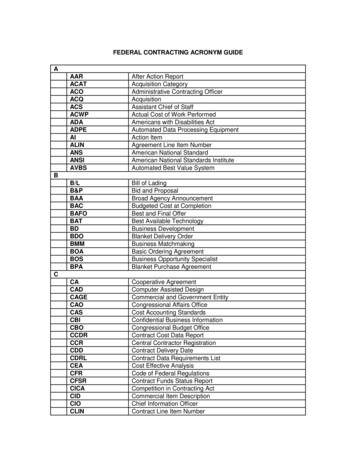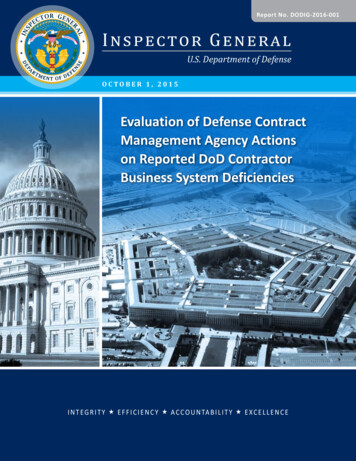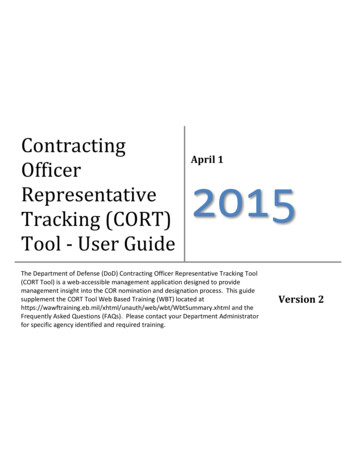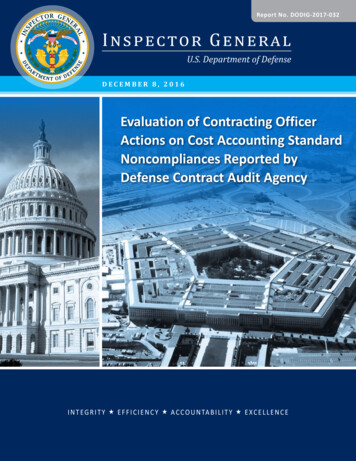
Transcription
Report No. DODIG-2017-032I nspec tor Ge ne ralU.S. Department of DefenseDECEMBER 8, 2016Evaluation of Contracting OfficerActions on Cost Accounting StandardNoncompliances Reported byDefense Contract Audit AgencyI N T E G R I T Y E F F I C I E N C Y A C C O U N TA B I L I T Y E X C E L L E N C E
I N T E G R I T Y E F F I C I E N C Y A C C O U N TA B I L I T Y E X C E L L E N C EMissionOur mission is to provide independent, relevant, and timely oversightof the Department of Defense that supports the warfighter; promotesaccountability, integrity, and efficiency; advises the Secretary ofDefense and Congress; and informs the public.VisionOur vision is to be a model oversight organization in theFederal Government by leading change, speaking truth,and promoting excellence—a diverse organization,working together as one professional team, recognizedas leaders in our field.F r a u d, W a s t e, & A b u s eHOTLINEDepartment of Defensedodig.mil/hotline 8 0 0 . 4 2 4 . 9 0 9 8For more information about whistleblower protection, please see the inside back cover.
Results in BriefEvaluation of Contracting Officer Actions on Cost AccountingStandard Noncompliances Reported by Defense ContractAudit AgencyDecember 8, 2017ObjectiveWe evaluated contracting officer actionson cost accounting standard (CAS)noncompliances reported by Defense ContractAudit Agency (DCAA). As part of our review,we selected 27 DCAA reports addressingnoncompliances with CAS 403, “Allocationof Home Office Expenses to Segments,”CAS 410, “Allocation of Business Unit Generaland Administrative Expenses to Final CostObjectives,” and CAS 418, “Allocation ofDirect and Indirect Cost.” We determinedwhether the contracting officer actions takenin response to the 27 reports complied withFederal Acquisition Regulation (FAR) 30.6,“Cost Accounting Standards Administration,”DoD Instruction 7640.02, “Policy for Follow‑upon Contract Audit Reports,” and applicableagency instructions.FindingsFor the 27 DCAA CAS reports we selected,we identified several instances in whichcontracting officers did not comply withFAR, DoD Instruction 7640.02, or agencyinstructions. We found: 12 instances in which contractingofficers did not issue a Notice ofPotential Noncompliance within 15 days,as FAR 30.605(b)(1) requires; 16 instances when contractingofficers failed to complete all actionson the reported noncomplianceswithin 12 months, as DoDInstruction 7640.02 requires; 3 instances in which contracting officersdid not have adequate documentationor rationale for determining that theDCAA-reported noncompliance wasimmaterial, contrary to FAR 30.602; andVisit us at www.dodig.milFindings (cont’d) 8 instances in which contracting officers did not obtaina legal review of their CAS determination, as DefenseContract Management Agency (DCMA), Instruction108 requires.As a result, correction of the reported CAS noncompliances wasdelayed. In addition, contractors may have been inappropriatelyreimbursed contractors additional costs resulting fromthe noncompliance.Also, in 15 of 27 instances, contracting officers did not accuratelyrecord the status of their actions in the DoD contract auditfollow-up system, as DoD Instruction 7640.02 requires. Theerrors diminished the reliability of the contract audit follow‑upsystem as a tool for monitoring contracting officer actions onCAS noncompliances.RecommendationsWe recommend that the Director, DCMA, and the Commander,Naval Sea Systems Command (NAVSEA), provide training onthe requirements for processing CAS noncompliances in atimely manner.We also recommend that the Director, DCMA: develop effective controls for helping to ensure thatcontracting officers adequately document their rationalewhen concluding that a noncompliance is immaterial, and remind contracting officers of the requirementsfor obtaining legal and management reviews ofCAS determinations.Management Comments andOur ResponseThe Director, DCMA and the Commander, NAVSEA, agreedwith the reported recommendations. The comments and theplanned corrective actions are responsive and no additionalcomments are required. DCMA and NAVSEA will provide trainingemphasizing the FAR 30.605 and DoD Instruction 7640.02requirements. In addition, the Agencies will assess the instancesof contracting officer noncompliance and take the appropriatecorrective actions.DODIG-2017-032 (Project No. D2016-DAPOCF-0018) i
Recommendations TableManagementRecommendationsRequiring CommentNo AdditionalComments RequiredDirector, Defense ContractManagement AgencyA.1, B, C, and D.1Commander, Naval Sea Systems CommandA.2 and D.2ii DODIG-2017-032 (Project No. D2016-DAPOCF-0018)
INSPECTOR GENERALDEPARTMENT OF DEFENSE4800 MARK CENTER DRIVEALEXANDRIA, VIRGINIA 22350-1500December 8, 2016MEMORANDUM FOR DIRECTOR, DEFENSE CONTRACT MANAGEMENT AGENCYCOMMANDER, NAVAL SEA SYSTEMS COMMANDSUBJECT: Report on Evaluation of Contracting Officer Actions on Cost Accounting StandardNoncompliances Reported by Defense Contract Audit Agency(Report No. DODIG-2017-032)We are providing this report for information and use. We evaluated contracting officeractions on Cost Accounting Standards (CAS) noncompliances reported by the DefenseContract Audit Agency (DCAA). Our evaluation disclosed several instances of actions thatwere not consistent with Federal Acquisition Regulation 30.6, “Cost Accounting StandardsAdministration,” DoD Instruction 7640.02, “Policy for Follow-Up on Contract Audit Reports,”or agency policy. We conducted this evaluation in accordance with the “Quality Standardsfor Inspections and Evaluations,” published in January 2012 by the Council of the InspectorsGeneral on Integrity and Efficiency.We considered management comments on a draft of this report when preparing thefinal report. Comments from the Director, Defense Contract Management Agency,and the Commander, Naval Sea Systems Command, conformed to the requirements ofDoD Instruction 7650.03; therefore, we do not require additional comments.Randolph R. StoneDeputy Inspector GeneralPolicy and OversightDODIG-2017-032 iii
ContentsIntroductionObjective. 1Background. 1FindingsFinding A. Contracting Officers Did Not Process CAS Noncompliancesin a Timely Manner. 4FAR Requires the Timely Processing of CAS Noncompliances. 4Contracting Officers Did Not Timely Issue Notices of PotentialNoncompliances or Obtain Contractor Responses. 5Delays in Dispositioning Reported Noncompliances. 5DCMA Contracting Officers are Not Always Using the Audit IssueTracking Tool. 6Conclusion. 6Recommendations, Management Comments, and Our Response. . 7Finding B. Contracting Officers Did Not Adequately Document theCAS Materiality Determination. . 9FAR Requires Adequate Documentation on the Materiality ofCAS Noncompliances. . 9Contracting Officers Did Not Adequately DocumentMateriality Determinations.10Conclusion. 13Recommendations, Management Comments, and Our Response. . 13Finding C. DCMA Contracting Officers Did Not Obtain Legal Reviewor Management Approval.14DoD and DCMA Instructions Require a Legal Review of CAS Determinations.14Contracting Officers Did Not Obtain a Legal Review of CAS Determinations.14DCMA Instructions Require Management Approval of CAS Determinations. 15Contracting Officers Did Not Obtain Management Approval ofCAS Determinations. . 15iv DODIG-2017-032
Contents (cont’d)DCMA Memorandum is Inconsistent with DCMA Instructionsfor Obtaining Management Approval. 15NAVSEA Management Actions.16Conclusion .16Recommendations, Management Comments, and Our Response. .16Finding D. Contracting Officers Did Not Maintain Accurate CAFU Data. 18Contracting Officers Entered Inaccurate Information in the CAFU System . 18Conclusion .19Recommendations, Management Comments, and Our Response. .19AppendixesAppendix A. Scope and Methodology. . 21Use of Computer-Processed Data. 21Prior Coverage. 21Appendix B. Time Taken to Process Reported Noncompliances. 23Appendix C. Contracting Officer Use of the DCMA Audit Issue Tracking Tool. 25Appendix D. Legal Review and Management Approval of CAS Determinations. 26Appendix E. Contract Audit Follow-Up System Data Accuracy. 28Management CommentsDefense Contract Management Agency. 30Naval Sea System Command. 35Abbreviations and Acronyms. . 38DODIG-2017-032 v
IntroductionIntroductionObjectiveWe evaluated contracting officer actions on Cost Accounting Standard (CAS)noncompliances1 reported by Defense Contract Audit Agency (DCAA) to determineif the actions complied with related requirements in the Federal AcquisitionRegulation (FAR), DoD Instructions, and agency policy. We focused our evaluationon contracting officer actions taken to address DoD contractor noncompliancesassociated with the following three standards: CAS 403, “Allocation of Home Office Expenses to Segments” [48 Code ofFederal Regulations (CFR) 9904.403] CAS 418, “Allocation of Direct and Indirect Costs” (48 CFR 9904.418) CAS 410, “Allocation of Business Unit General and AdministrativeExpenses to Final Cost Objectives” (48 CFR 9904.410)As part of the evaluation, we selected 27 DCAA audit reports issued betweenJanuary 2014 and June 2015 that reported on CAS 403, CAS 410, or CAS 418noncompliances. See Appendix A for a discussion of our scope and methodology.BackgroundCost Accounting StandardsCost Accounting Standards are a set of 19 standards and rules promulgatedby the United States Government for use in determining costs on negotiatedprocurements. The standards are designed to achieve uniformity andconsistency with the cost accounting principles followed by DoD contractorsand subcontractors.Title 48 CFR 9901.306, “Standards applicability,” mandates the use of costaccounting standards by all executive agencies and by contractors andsubcontractors in estimating, accumulating, and reporting costs on Government1CAS noncompliances occur when the contractor fails to comply with applicable CAS in title 48 Code of FederalRegulations Part 9904, or fails to consistently follow disclosed or established cost accounting practices.DODIG-2017-032 1
Introductioncontracts. Title 48 CFR 9904 addresses the purpose and fundamental requirementsif each standard. The three standards covered in this evaluation are describedas follows:CAS 403, Allocation of Home Office Expenses to SegmentsCAS 403 establishes criteria for allocating a contractor’s home officeexpenses to business segments. 2CAS 410, Allocation of Business Unit General and AdministrativeExpenses to Final Cost ObjectivesCAS 410 provides criteria for the allocation of business unit generaland administrative expenses to contracts (also referred to as “final costobjectives”). General and administrative expenses represent the cost of themanagement and administration of the business unit as a whole.CAS 418, Allocation of Direct and Indirect CostsCAS 418 provides for the: (1) consistent determination of direct andindirect costs, (2) accumulation of indirect costs, and (3) selection ofappropriate measures for allocating indirect costs to contracts.Defense Contract Audit AgencyDCAA performs contract audits for DoD and operates in accordance withDoD Directive 5105.36, “Defense Contract Audit Agency,” January 4, 2010. DCAAperforms several types of contract audits, including audits of DoD contractorcompliance with the CAS.DCAA performs CAS audits to determine if a DoD contractor’s policies, procedures,and practices comply with the CAS requirements. When DCAA uncovers a CASnoncompliance during an audit, it issues a report to the contracting officerresponsible for determining whether a noncompliance exists. If the contractingofficer agrees with DCAA that a noncompliance exists and believes it is material,the contracting officer must direct the contractor to correct the noncompliantpractice and submit an estimate of the cost impact on Government contracts.22 DODIG-2017-032A segment is one of two or more divisions, product departments, plants, or other subdivisions of an organizationreporting directly to a home office, and responsible for profit and producing a product or service.
IntroductionDefense Contract Management AgencyDCMA is a component of the DoD that works directly with DoD contractorsto ensure that DoD, Federal and allied government supplies and services aredelivered on time, at projected cost, and meet performance requirements. In mostinstances, DCMA contracting officers are responsible for determining a contractor’scompliance with CAS.Of the 27 DCAA reports we selected for evaluation, DCMA contracting officers wereresponsible for taking action on 25 of the reports.Naval Sea Systems Command and the Supervisor ofShipbuilding, Conversion and RepairNaval Sea Systems Command (NAVSEA) is the largest of the Navy’s five systemscommands and the Navy’s central activity for designing, engineering, integrating,building, and procuring ships and shipboard weapons and combat systems.NAVSEA executes ship construction contracts at four Supervisor of Shipbuilding,Conversion and Repair (SUPSHIP) facilities located throughout the United States toensure the highest quality ships are delivered to the fleet. SUPSHIPs are co‑locatedwith major shipbuilders and act as the Navy’s on-site technical, contractual, andbusiness authority. SUPSHIPs contract administration responsibilities includetaking action on DCAA CAS noncompliance audit reports.Of the 27 DCAA reports we selected for evaluation, SUPSHIP contracting officerslocated in Bath, Maine, and Pascagoula, Mississippi, were responsible for takingaction on 2 of the reports.DODIG-2017-032 3
FindingsFinding AContracting Officers Did Not Process CASNoncompliances in a Timely MannerIn 12 of 27 cases, contracting officers did not issue a notice of potentialnoncompliance within 15 days as FAR 30.605(b)(1), “Processing Noncompliances,”requires. In 8 of 27 cases, contracting officers did not obtain the contractor'sresponse to the reported noncompliances within 60 days, or other mutuallyagreeable date, as FAR 30.605(b)(2)(ii) requires. In addition, in 16 of 27 cases,contracting officers did not complete the disposition of CAS noncompliances within12 months, as DoD Instruction 7640.02, “Policy for Follow-Up on Contract AuditReports,” requires. Also, the contracting officers did not document any reasons forfailing to process noncompliances within the prescribed timeframes.The contracting officers’ failure to take timely action delayed the correction of thenoncompliances and the recovery of any increased cost due the Government. Theconsistent use of DCMA’s Audit Issue Tracking Tool may have prevented some ofDCMA’s untimely actions.FAR Requires the Timely Processing ofCAS NoncompliancesFAR 30.605 includes the following requirements for ensuring that noncompliancesare addressed in a timely manner: FAR 30.605(b)(1) requires the contracting officer, within 15 days ofreceiving a DCAA report, to notify DCAA that the contracting officerdisagrees with the reported noncompliance, or issue a notice of potentialnoncompliance to the contractor if the contracting officer agrees with thereported noncompliance.FAR 30.605(b)(2)(ii) states that the contractor will be allowed 60 days orother mutually agreeable date to respond to a contracting officer’s noticeof noncompliance.In addition, DoD Instruction 7640.02, enclosure 3, paragraph 3.a, requires that thecontracting officer: 4 DODIG-2017-032disposition audit reports within 12 months of the audit report date; anddocument actions the contracting officer took to achieve disposition atleast monthly, if the audit report is not dispositioned within 12 months.
FindingsContracting Officers Did Not Timely IssueNotices of Potential Noncompliances or ObtainContractor ResponsesIn 12 of 27 cases, DCMA and NAVSEA contracting officers exceeded the 15‑daytimeframe established in FAR 30.605(b)(1) for issuing a notice of potentialnoncompliance to the contractor (see list in Appendix B). On average,the contracting officers took 111 days to issue the 12 notices of potentialnoncompliance. The contracting officers’ files did not include justification forexceeding the 15 day timeframe.In 8 of 27 cases, DCMA and NAVSEA contracting officers also exceeded the 60-day(or mutually agreeable) timeframe in FAR 30.605(b)(2)(ii) for obtaining contractorresponses to the noncompliances. On average, contracting officers took 94 daysto obtain the 8 contractor responses. In addition, once the contractor responsesbecame overdue, the contracting officers’ files did not indicate that the contractingofficer had followed up with the contractor to obtain the responses.Timely processing of noncompliances is important to ensure the contractorpromptly corrects the noncompliant practice and the Government recoups any costimpact resulting from the noncompliance.Delays in Dispositioning Reported NoncompliancesIn 16 of 27 cases, contracting officers did not disposition the reported CASnoncompliance within the 12-month timeframe established in DoDInstruction 7640.02. On average, contracting officers took 19 months to dispositionthe 16 reported noncompliances (see Appendix B). In addition, contracting oficersdid not include an explanation for the delay in the contract file. Further, thecontracting officers did not document the actions to achieve disposition of the16 cases, as DoD Instruction 7640.02 enclosure 3, paragraph 3.a, requires.As of June 30, 2016, contracting officers have not yet dispositioned 6 of the16 cases. Of the six cases, five are assigned to DCMA contracting officers andone is assigned to a SUPSHIP contracting officer (who reports to NAVSEA). DCMAand NAVSEA need to assess these six cases and determine the additional actionsthat the contracting officers should take to appropriately disposition the reportednoncompliances, or document at least monthly their actions to achieve disposition.DODIG-2017-032 5
FindingsDCMA Contracting Officers are Not Always Using theAudit Issue Tracking ToolSince June 1, 2012, DCMA has maintained an internal control referred to asthe “Audit Issue Tracking Tool.” The Tool provides an automated method oftracking the status of CAS noncompliances to ensure contracting officers take allappropriate actions and recover any funds due to the Government. DCMA guidancerequires the contracting officer to create a record in the Tool within 5 days ofreceiving the reported noncompliance. According to DCMA procedure, managementis responsible for ensuring that contracting officers create and update the recordsin the Tool.In 8 of the 25 DCMA cases we evaluated, contracting officers did not create arecord in the Tool as DCMA guidance requires (see Appendix C). The Tool isimportant for ensuring that contracting officers take timely actions on reportedCAS noncompliances. The consistent use of the Tool could have prevented some ofthe untimely actions we identified. DCMA management should implement controlsto better enforce and monitor the use of the Tool.ConclusionSeveral contracting officers did not issue the notice of potential noncompliance orobtain the contractor’s response to the notice in a timely manner, as FAR 30.605requires. In addition, several contracting officers exceeded the 12-monthtimeframe for dispositioning the reported noncompliances, as DoD Instruction7640.02 requires. The contract files did not include justification for the actionsnot being completed in a timely manner. The consistent use of the Audit IssueTracking Tool could have prevented some of the untimely actions. The failureto take timely actions in response to CAS noncompliance reports delayedcorrection of the reported noncompliances and the recovery of any potentialincreased costs due to the Government. For example, in response to Audit ReportNo. 41412012D19200002, the contracting officer took 23 months to issue her finaldetermination and initiate recovery of a 718,000 cost impact for the inappropriateallocation of contractor home office expenses.For the six cases that have not been dispositioned, DCMA and NAVSEA managementshould request that the contracting officers promptly complete all appropriateactions. DCMA and NAVSEA should provide training to contracting officers onthe FAR 30.605 and DoD Instruction 7640.02 timeframes for processing CASnoncompliances. Finally, contracting officers need to document rationale whenthey do not meet the required timeframes.6 DODIG-2017-032
FindingsRecommendations, Management Comments, andOur ResponseRecommendation A.1We recommend the Director, Defense Contract Management Agency, to:a. assess the five cases that have not been dispositioned and determinethe additional actions contracting officers should take to complete theiractions on the noncompliances.Director, Defense Contract Management Agency, CommentsThe Director, DCMA, agreed and stated the DCMA Group Director is assessingthe five cases to determine all actions the contracting officers should taketo disposition the noncompliances. DCMA will complete the assessment byNovember 15, 2016.Our ResponseComments from the Director, DCMA, addressed all specifics of the recommendationand no additional comments are required.b. provide training to contracting officers on:1. Timely processing cost accounting standard noncompliances inaccordance with Federal Acquisition Regulation 30.605 and DoDInstruction 7640.02.2. Documenting reasons for not meeting the timelines.3. Consistently using the Audit Issue Tracking Tool for monitoringcost accounting standard noncompliances.Director, Defense Contract Management Agency, CommentsThe Director, DCMA, agreed and stated that DCMA plans to develop CAFU trainingfor the Defense Acquisition University College of Contract Management in FY 2017.The intent of the training is to provide contracting personnel with real time accessto the CAFU requirements, whether they are new to the requirements or theyneed to refresh their knowledge. The training content will emphasize meeting thetimelines required by FAR 30.605 and DoD Instruction 7640.02. In the interim,DCMA will provide online training to contracting personnel by February 17, 2017.DODIG-2017-032 7
FindingsOur ResponseComments from the Director, DCMA, addressed all specifics of the recommendationand no additional comments are required.Recommendation A.2We recommend that the Commander, Naval Sea Systems Command, throughthe Commander, Supervisor of Shipbuilding, Conversion and Repair FieldProcurement Oversight:a. Assess the one case that has not been dispositioned and determine theadditional actions that should be taken on the noncompliance.b. Provide training to contracting officers on:1. Timely processing cost accounting standard noncompliances inaccordance with Federal Acquisition Regulation 30.605 and DoDInstruction 7640.02.2. Documenting reasons for not meeting the timelines.Commander, Naval Sea Systems Command, CommentsThe Commander, NAVSEA, agreed and made updates to the CAFU system. Inaddition, the Deputy Division Director, Field Competency, will provide trainingemphasizing the FAR 30.605 and DoD Instruction 7640.02 requirements. NAVSEAexpects to provide the training by January 31, 2017.Our ResponseThe comments from the Commander, NAVSEA, addressed all specifics of therecommendation and no additional comments are required. After we receivedNAVSEA’s comments, the Commander informed us that the contracting officer willissue his final decision on the reported CAS noncompliance by December 19, 2016.8 DODIG-2017-032
FindingsFinding BContracting Officers Did Not Adequately Document theCAS Materiality DeterminationIn 3 of 27 cases, DCMA contracting officers did not have adequate documentationor rationale to support their determination that a CAS noncompliance isimmaterial, as FAR 30.602 requires. As a result, the contracting officers may haveinappropriately reimbursed DoD contractors for increased costs associated withCAS noncompliances.In addition, for all three cases, the contracting officers did not obtain required legalreviews or management approvals, which may have helped to ensure that theirdeterminations were supported.FAR Requires Adequate Documentation on theMateriality of CAS NoncompliancesThe FAR includes the following requirements for adequately documenting themateriality of CAS noncompliances: FAR 30.602(b)(2), “Materiality,” requires that a CAS determinationof materiality be based on adequate documentation. In addition,FAR 30.602(c)(2) requires the contracting officer to document therationale for determining that a CAS noncompliance is immaterial.FAR 30.605(d)(4)(i) requires that the contractor submit a general dollarmagnitude (GDM) proposal to the contracting officer that specifies theimpact of the noncompliance by Executive agency.FAR 30.605(h)(1) requires the contractor to include all affected contractsin the assessment of materiality.DODIG-2017-032 9
FindingsContracting Officers Did Not Adequately DocumentMateriality DeterminationsIn 9 of 27 cases, DCMA contracting officers determined that the cost impact tothe Government for CAS noncompliances reported by DCAA were immaterial. Asdiscussed in the following paragraphs, in 3 of the 9 cases, contracting officers didnot have adequate documentation or rationale for their conclusion that the CASnoncompliance was immaterial, as FAR 30.602 requires:DCAA Audit Report Number 6211-2014C19200001The DCAA audit report stated that the contractor’s method for accumulatinggeneral and administrative costs did not comply with CAS 403, “Allocation of HomeOffice Expenses to Segments,” from 2004 through 2008. The contractor agreedwith the noncompliance and corrected the noncompliance for 2009 and forward.As the contracting officer requested, the contractor submitted an estimated impactof the noncompliance, which suggested that the overall impact to the Governmentwas im
DoD Directive 5105.36, "Defense Contract Audit Agency," January 4, 2010. DCAA performs several types of contract audits, including audits of DoD contractor compliance with the CAS. DCAA performs CAS audits to determine if a DoD contractor's policies, procedures, and practices comply with the CAS requirements. When DCAA uncovers a CAS

